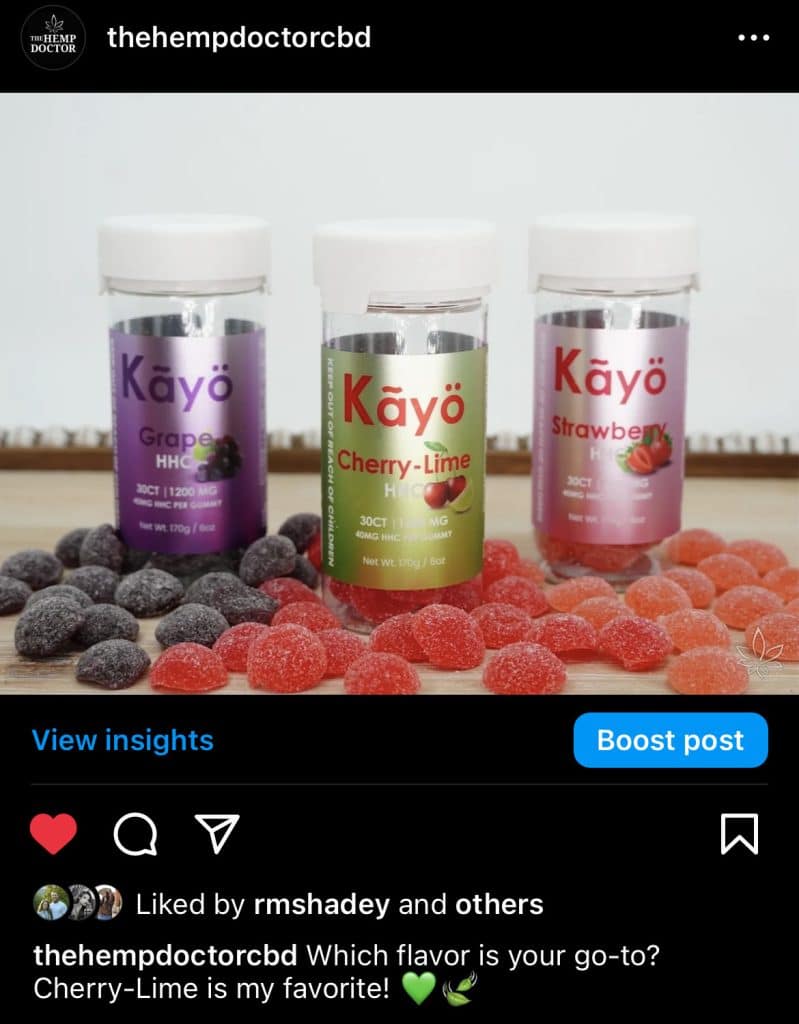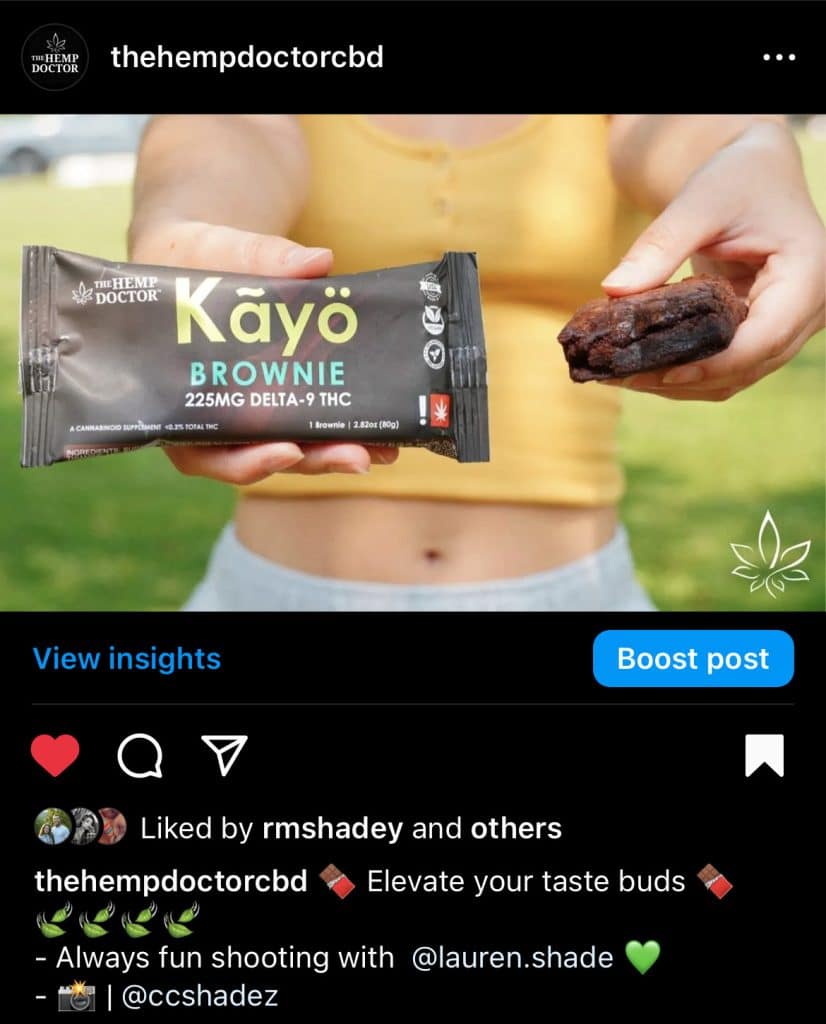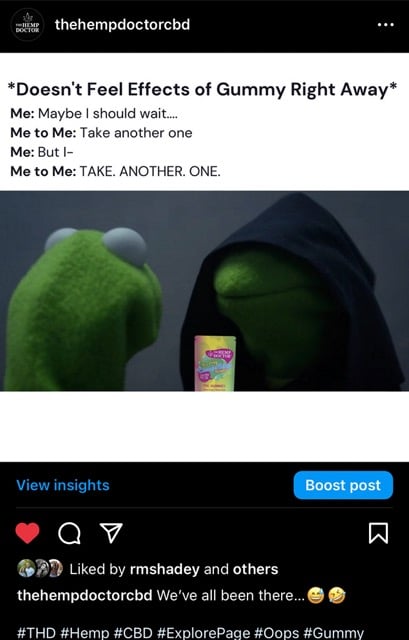Delta 8, Delta 9, HHC & THC-O: Legality of Your Favorite Cannabinoid
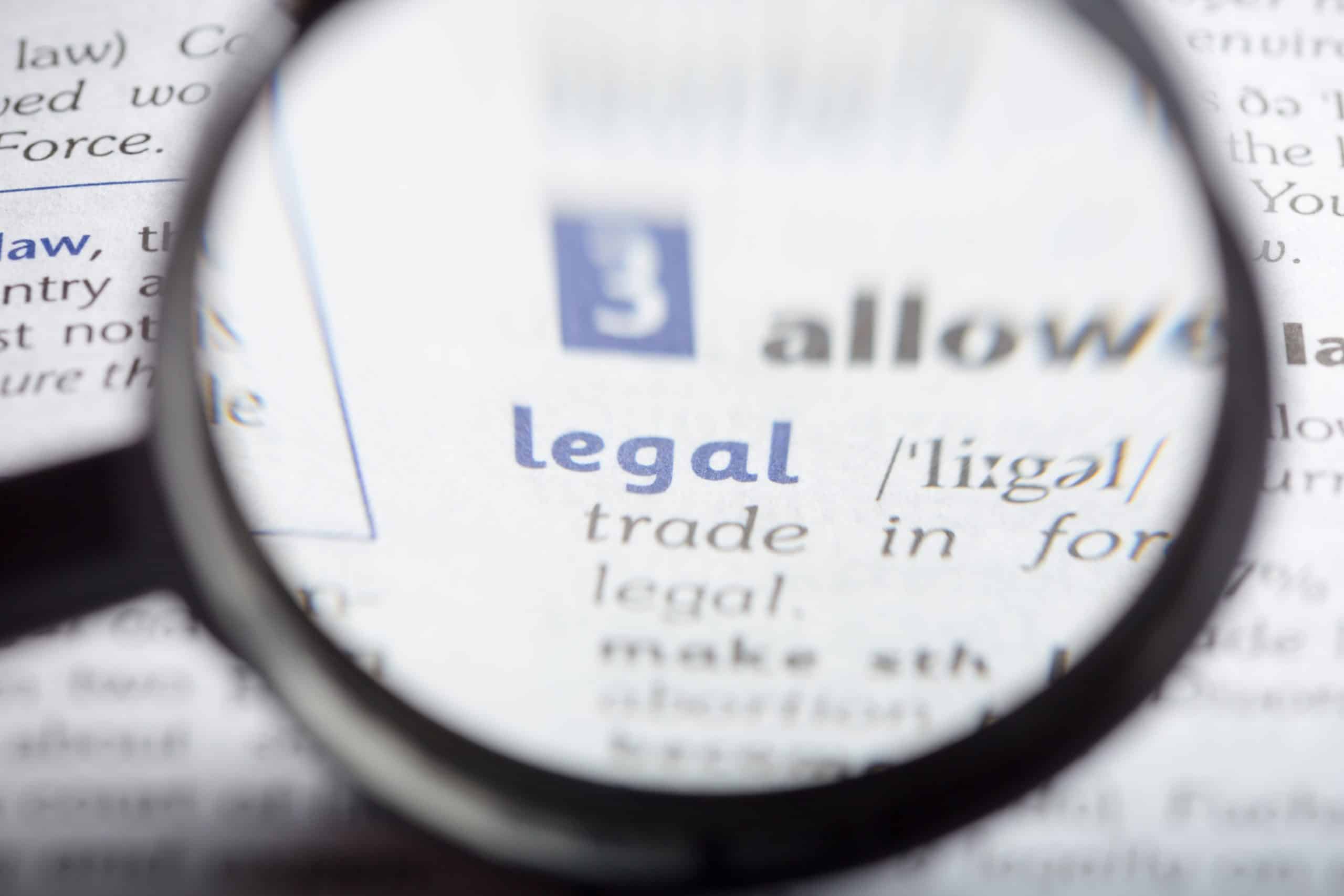
As innovative technology graces its presence within the hemp industry, the emergence of new cannabinoids is at an all time high. If you’re a regular consumer of hemp-based products, you may find yourself wondering about the legality of psychoactive cannabinoids such as Delta 8 THC, Delta 9 THC, HHC, and THC-O.
Whether you’re smoking a new vape or enjoying your favorite edible, questions such as “Is this product legal in my state?” or “Can I travel with this?” may arise. While it’s recommended to always check your individual state’s laws, we want to shed some light on your concerns.
At The Hemp Doctor, we strive to create and provide the most innovative hemp-infused products on the market that ship anywhere in the United States, so it’s important that we keep you informed.
It is crucial to be mindful that the federal Food and Drug Administration has the ability to approve or deny any CBD or marijuana-based products and determines how these products will be purchased and used.
With the 2018 Farm Bill allowing hemp and its derivatives with no more than 0.3% THC to be federally legal (although this may be subject to change soon due to The Hemp Advancement Act), there is still some gray area regarding the legality of these compounds in certain states, especially towards potent cannabinoids such as Delta 9. Let’s take a look at the legal status of these four cannabinoids in a state-by-state comparison.
Where is Delta 8 THC Legal?
Delta-8-tetrahydrocannabinol, or Delta 8 THC is a popular cannabinoid that is an isomer of THC. It is a naturally occurring analogue of THC within the hemp plant. Even though Delta 8 is a psychoactive compound, it is much less potent in its effects of a “high”, compared to Delta 9 THC. Delta-8 products are known to be a better option for users that are looking for a cannabinoid with milder euphoric effects.
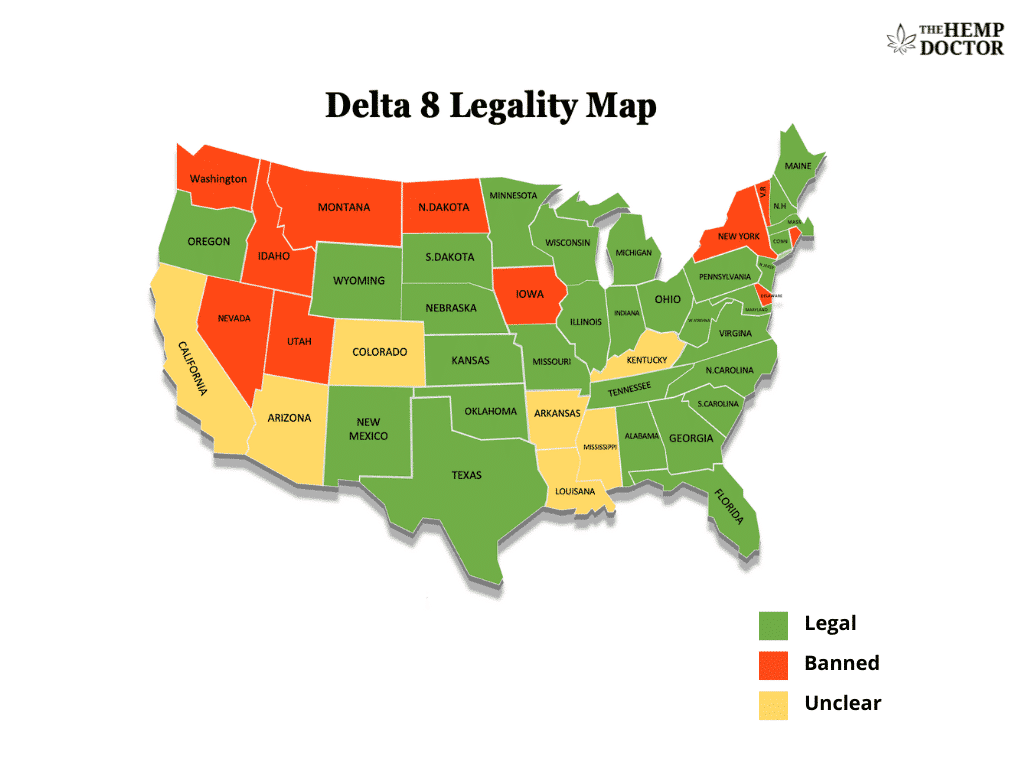
Currently, Delta 8 is legal on a federal level in the following states:
Alabama, Connecticut, Michigan, Florida, Georgia, Hawaii, Illinois, Indiana, Kansas, Maine, Maryland, Massachusetts, Minnesota, Missouri , Nebraska, New Hampshire, New Jersey, New Mexico, North Carolina, Ohio, Oklahoma, Oregon, Pennsylvania, South Carolina, South Dakota, Tennessee, Texas, Virginia, West Virginia, Wisconsin, and Wyoming.
The following states have imposed a ban on Delta 8, most likely because of the origin of the cannabinoid:
- Alaska
- Delaware
- Idaho
- Iowa
- Montana
- Nevada (Delta 8 is only allowed to be purchased from a licensed dispensary)
- New York
- North Dakota
- Rhode Island
- Utah
- Vermont
- Washington
There are also a few states where the legality of Delta 8 THC is still unclear, which is why it is always key to stay up to date with your state’s laws regarding cannabis and its compounds:
- Arizona
- Arkansas
- California
- Colorado.
- Kentucky
- Mississippi
- Louisiana
Where is Delta 9 Legal?
Delta 9 THC is likely favored among regular cannabis users since it is the primary reason for marijuana’s psychoactive properties. Delta 9 is able to create more of a euphoric feeling since it holds more potency than other cannabinoids, such as Delta 8.
When determining the legality of this compound, things can get a little tricky. The power of the Farm Bill passed in December of 2018 changed the game for hemp-derived substances.
According to federal law, a hemp-based product is allowed up to 0.3% of hemp-derived Delta-9 THC on a dry weight basis. This means that products infused with Delta 9 are only allowed as long as the cannabinoid is derived from industrial hemp plants and not marijuana plants (a cannabis plant that contains more than 0.3% THC).
Although the Farm Bill created quite a loophole for the hemp industry, it is also important to consider the Controlled Substances Act, and the Federal Analogue Act when determining the legal status for a potent, psychoactive cannabinoid such as Delta 9. These acts were instituted to place control on chemical substances that have attributes like this cannabinoid.
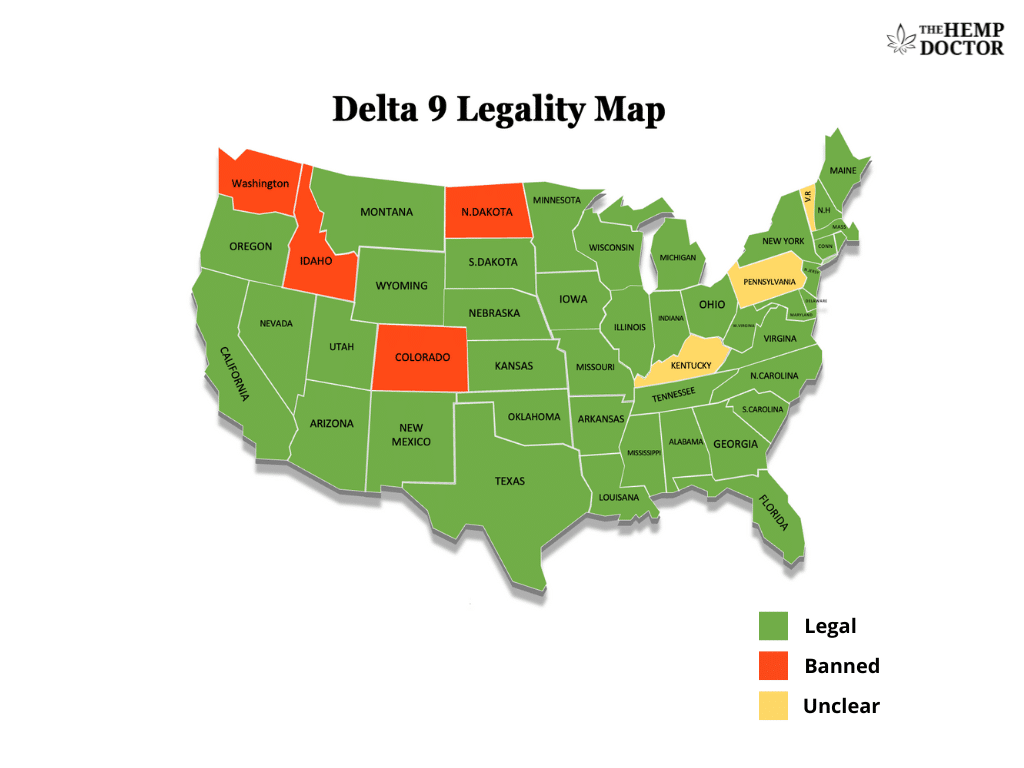
With this in mind, you may legally buy hemp-derived Delta 9 products in the following states: Alabama, Alaska, Arizona, Arkansas, California, Delaware, Florida, Georgia, Hawaii, Idaho, Illinois, Indiana, Iowa, Kansas, Louisiana, Maine, Maryland, Massachusetts, Michigan, Minnesota, Mississippi, Missouri, Montana, Nebraska, Nevada, New Hampshire, New Jersey, New Mexico, New York, North Carolina, Ohio, Oklahoma, Oregon, Puerto Rico, Rhode Island, South Carolina, South Dakota, Tennessee, Texas, Utah, Virginia, West Virginia, Wisconsin, Wyoming, and Washington D.C.
The only state to place specific regulations on Delta 9 THC is California, which requires companies that produce hemp products to ensure that they do not surpass the limit of 0.3% THC in their products.
The following states have placed a ban on Delta 9 THC, due to a restriction on the conversion of CBD into THC isomers:
- Colorado
- North Dakota
- Washington
- Idaho (Delta 9 is illegal in this state altogether due to the Controlled Substances Act)
Kentucky, Pennsylvania, and Vermont are states where the legality of this compound is still unclear, creating a gray area for the use of Delta 9 products in these areas.
Where is HHC Legal?
HHC, otherwise known as hexahydrocannabinol, is one of the newest cannabinoids to hit the cannabis scene. HHC was discovered by Chemist Roger Adams, who was the first to synthesize this cannabinoid in his lab. HHC differs from THC due to the added Hydrogen molecule within the compound. This cannabinoid produces similar psychoactive side effects to Delta 9 THC, but does not hold as much potency as Delta 9 or THC-O.
Since this synthetic cannabinoid is still a newbie to the hemp and cannabis industry, it can be a little confusing to diagnose the exact legal status of it. Fear not, as we’re here to clear up some of the confusion.
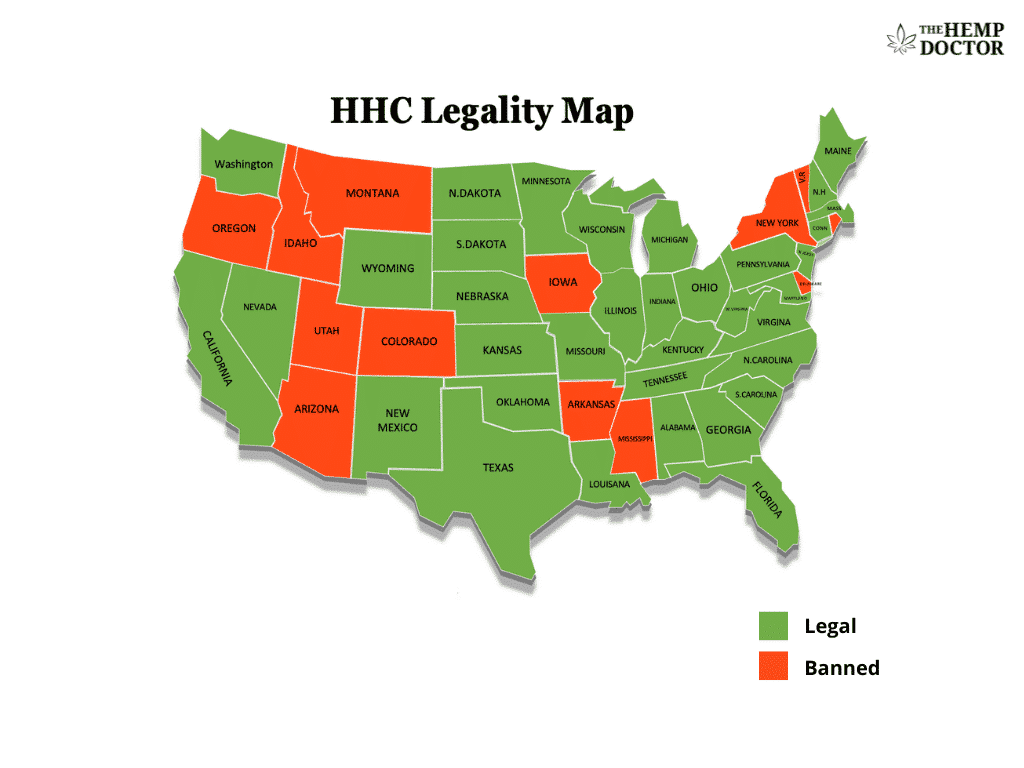
HHC is currently legal in the following states: Alabama, California, Connecticut, Florida, Georgia, Hawaii, Illinois, Indiana, Kansas, Kentucky, Louisiana, Maine, Maryland, Massachusetts, Michigan, Minnesota, Missouri, Nebraska, Nevada, New Hampshire, New Jersey, New Mexico, North Carolina, North Dakota, Ohio, Oklahoma, Pennsylvania, South Carolina, South Dakota, Tennessee, Texas, Virginia, Washington, West Virginia, Wisconsin, and Wyoming.
The following states have imposed a ban on HHC:
- Alaska
- Arizona
- Arkansas
- Colorado
- Delaware
- Idaho
- Iowa
- Mississippi
- Montana
- New York
- Oregon
- Rhode Island
- Utah
- Vermont
Is THC-O Legal?
Similar to HHC, THC-O is another cannabinoid that was newly introduced to the cannabis world as of recently. Also known by its scientific name, tetrahydrocannabinol acetate, THC-O acetate is essentially synthetic since it’s lab-made and an artificial analogue of THC. Some users may even argue that side effects from THC-O are even stronger than Delta 9 itself. In order for hemp-derived products infused with this compound to be considered federally legal, it must contain no more than 0.3% THC.
With this in mind, the legality of THC-O has potentially been affected, due to a recent letter from the U.S. Drug Enforcement Administration (DEA). Attorney Rod Kight, who is in charge of the operations for the website cannabusiness.law, sent an email on August 17, 2022 to the DEA for clarification on the exact legal status of THC-O.
When Kight did not receive a response to this email for many months, he followed up with the DEA on February 7, 2023 asking for clarification once again. Within a week, the DEA responded to Kight’s letter and stated that even though THC-O is synthesized from hemp-derived Delta 9 THC, they do not consider it a form of hemp.
According to a Forbes article discussing the potential change in legality of THC-O, however, certain states may still take part in putting the cannabinoid in their products in order to coincide with the development of their hemp-based economies.
As for now, the exact legal status of THC-O is uncertain and subject to change at any time, as new laws are constantly developing. Once again, we can’t stress enough on the importance of staying up to date with your state laws, as the legal status of these cannabinoids is ever-evolving.
Traveling With Your Favorite Cannabinoid
Now that you have some knowledge on the legality of these cannabinoids, you may find yourself thinking twice about packing that vape or new gummies with you when taking a vacation.
When traveling by airplane, you should consider federal and state laws, TSA, as well as airline regulations. We recommend checking with the individual airline you are flying with.
- Vapes: It is a TSA requirement for vapes and cartridges to be packed in a carry-on bag, and not checked in.
- Gummies/Edibles: Edibles may be permissible in both your carry-on and checked bags.
- Tinctures/Topicals: These items should be stored in your carry-on luggage, but cannot contain more than 3.4 ounces (100 ml) of liquid product as according to TSA requirements.
Remember that products cannot contain more than 0.3% of Delta 9 THC when traveling by airplane. It may also be helpful to bring documentation with you to prove that your products are hemp-derived and do not exceed more than 0.3% THC.
While it is important to always do your research and err on the side of caution, we have some tips that can be useful for your travels and ease your concerns:
- Make sure to always check the laws and regulations regarding hemp-derived products in the state you are traveling to.
- Purchase high-quality products from a reputable distributor (such as The Hemp Doctor!)
- Check to see if your specific product meets the state and federal guidelines of your desired destination.
- It’s recommended not to carry products in bulk – take only what you need with you.
- Be mindful that products containing hemp-derived cannabinoids will show up positive on a drug test.
To Conclude
At The Hemp Doctor, we do our best to keep our customers informed about the evolving hemp industry. It is essential to stay updated on the legality of these cannabinoids to ensure that using your favorite hemp product complies with your state’s laws. It is also key to be mindful of ever-changing laws surrounding hemp and cannabis. As always, if you have any further questions or comments about these hemp cannabinoids, visit The Hemp Doctor Blog or contact our Customer Service and we’ll be happy to assist you!

